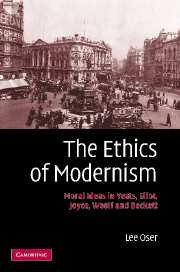Book contents
- Frontmatter
- Contents
- Acknowledgments
- Introduction: literature and human nature
- 1 W. B. Yeats: out of nature
- 2 T. S. Eliot: the modernist Aristotle
- 3 James Joyce: love among the skeptics
- 4 Virginia Woolf: Antigone triumphant
- 5 Samuel Beckett: humanity in ruins
- Conclusion: technology and technique
- Notes
- Works Cited
- Index
Introduction: literature and human nature
Published online by Cambridge University Press: 22 September 2009
- Frontmatter
- Contents
- Acknowledgments
- Introduction: literature and human nature
- 1 W. B. Yeats: out of nature
- 2 T. S. Eliot: the modernist Aristotle
- 3 James Joyce: love among the skeptics
- 4 Virginia Woolf: Antigone triumphant
- 5 Samuel Beckett: humanity in ruins
- Conclusion: technology and technique
- Notes
- Works Cited
- Index
Summary
Human nature restores a perspective on modernism that has been lost. Without this perspective, we can see little of the modernist moral project, which is to transform human nature through the use of art. Why should we remember the block of marble, dragged through the squalid province, before the breath of genius gave it life? Or more accurately, why remember the dray and the windgalled animal that pulled it, when we bask in the favor of Toyota and Boeing, NASA and Maersk? And yet the old question has unmistakably returned: what good is there in human nature?
Our answer will depend on our school of thought. I understand the issue as a choice between two alternatives, both ambitious and both imperfect. One is the New Darwinism. Its exponents are mostly scientists and social scientists who want to reinvent the liberal arts in the image of Darwin. Their growing success is connected to the larger role of science in uncovering intellectual fraud in the humanities.
Steven Pinker embodies the strengths and weaknesses of the New Darwinist school. A polymath reaching a wide audience with clear prose, Pinker brings Darwinian naturalism to bear both on modernist literature and on modernity itself. In The Blank Slate: The Modern Denial of Human Nature, he shows that Darwinian science contradicts modernism on such immensely important topics as sex, psychology, and the meaning of art. Woolf, in particular, attracts Pinker's scorn with her famous statement, “in or about December, 1910, human character changed.”
- Type
- Chapter
- Information
- The Ethics of ModernismMoral Ideas in Yeats, Eliot, Joyce, Woolf and Beckett, pp. 1 - 24Publisher: Cambridge University PressPrint publication year: 2007



